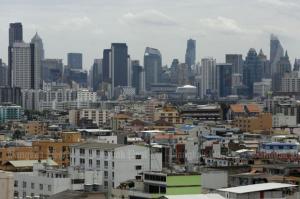Thailand in Apec’s ‘top 5’ for bosses
Da Nang: Thailand is among the top five targets for business leaders’ overseas investment among the Asia-Pacific Economic Cooperation (Apec) economies, according to the latest survey of Asia-Pacific business leaders.
The other four are Vietnam, China, Indonesia and the US.
PwC polled 1,412 business leaders in the 21 Apec member economies in the survey conducted from May to July this year. Foreign chief executives said they were 47% more likely to raise investment levels over the next 12 months in Vietnam, followed by 45% for Indonesia and 36% for Thailand. Only 31% indicated higher investment for Singapore and Malaysia.
“As a region, Southeast Asia is relatively stable politically, has a population of more than 600 million and a relatively young workforce. The economic policies of each country are very pro-business, encouraging corporate investment,” said Sridharan Nair, territory senior partner for PwC Malaysia/Vietnam.
He was speaking in Da Nang, Vietnam, where the Apec CEO Summit kicked off yesterday, and will run until tomorrow.
Every country in the region, including Thailand, is a beneficiary of that momentum, and there is a record of successful investment here, said Mr Nair.
“Thailand always has a strong base of overseas manufacturers. And I think while Thailand will have to compete with other emerging markets, it will still attract investment from Japan or other global investors,” he told the Bangkok Post.
“More mature economies like Malaysia and Thailand will need to lift their gains further to compete with the likes of Vietnam and the Philippines,” he said, adding that the final decision will also depend on how attractive the incentives or ease of doing business in each country.
“Perhaps the more recent changes in the political front have changed people’s opinions but what the survey clearly shows is that they have not lost the optimism in investing in Thailand,” he said.
According to the survey, Vietnam, Russia, the Philippines, Indonesia and Malaysia enjoy domestic investment the most, and Asia-Pacific business leaders’ confidence has hit a three-year high despite trade frictions.
Some 37% of chief executives, up from 28% last year, said they were very confident of revenue growth during the next 12 months, despite trade policy uncertainty and related political tensions in many of the Apec economies.
In the next year, 50% of businesses surveyed said they would increase their global investment, with 71% of the expansion planned for Asia-Pacific. Only 43% of respondents said so last year. At the same time, 63% of Apec chief executives said they expected to expand their business globally over the next three years.
Among the chief executives’ concerns were restrictive trade conditions, particularly the movement of labour and goods. About one-third of the business leaders wanted Apec to take the lead in exploring labour mobility solutions, the survey reported.
Almost a quarter of the respondents said they experienced a more restrictive environment, especially in employing foreign labour (23%) and in moving goods across borders (19%).
Subsequently, 71% of the chief executives said they expected to rely more on business partnerships, and 68% said they planned to increase business domestically or in economies with bilateral ties.
In the meantime, 58% of businesses had turned to automation in certain areas, and around 40% said they were investing in machine learning and emerging technologies, as well as investing in the people who can operate them.
The Apec CEO Summit is organised on the sidelines of the annual Apec Summit.
US President Donald Trump is due to attend the Apec Summit later this week. All eyes will be on what will come out of the meeting when it comes to regional cooperation, after the US decided to pull out of the Trans-Pacific Partnership (TPP) in January.
The president has shown more interest in bilateral talks.
The Regional Comprehensive Economic Partnership, expected to be discussed among the 10 Asean members and six dialogue partners at the Asean Summit in the Philippines later this week, is seen as an alternative to the TPP, which excludes China and India.
Source: https://www.bangkokpost.com/business/news/1357147/thailand-in-apecs-top-5-for-bosses


 Thailand
Thailand




